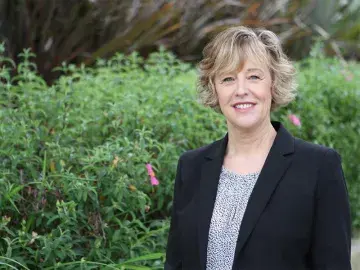Compassion Urged for Nurses Treating Traumatized Students
A psychologist visiting Samuel Merritt University (SMU) urged a group of public school nurses from Alameda and Contra Costa counties to show compassion when confronted with children who are acting out because their problem behavior could be caused by trauma they have experienced rather than intentional defiance.
“It feels like you’re tap dancing through a minefield sometimes,” Michael Boroff, a clinical psychologist at K
Boroff was one of several speakers at the Ethnic Health Institute’s School-Based Nursing Symposium on Oct. 14. It was the 11th annual symposium, but the first devoted to mental health.
Arlene Swinderman, director of the Ethnic Health Institute at SMU, said previous symposiums have focused on chronic illnesses such as diabetes and asthma. She said the overwhelming request among school nurses this year was to learn more about mental health.
Boroff urged the more than 100 nurses and SMU nursing students at the symposium to practice trauma-informed care, a technique he described as “engaging in and establishing relationships with people with whom relationships have never been safe.” To do that, he said, health practitioners should follow through on what they promise, encourage students to speak up about what they need, and show them compassion rather than frustration.
“They push people away,” Boroff said of traumatized children. “They’re challenging, they’re really tough.”
Major trauma can stem from critical events such as exposure to death, serious injury or sexual violence. For children, Boroff said, experiencing ongoing trauma in their families or communities is the top predictor of school suspension and academic failure, with possible long-term impacts including increased risk of disease and premature deat
“It’s safer to assume someone you’re working with have experienced trauma than that they have not,” Boroff said, particularly students in inner-city schools.
Instead of asking a troubled student what is wrong with them, Boroff encouraged nurses to ask them their story – why they are acting out. “Part of healing from trauma us helping people rewrite that story,” he said.
He said using meditation would be more beneficial than suspension for children suffering from anxiety or stress as a result of trauma, and mindfulness can help health practitioners as well.
“It’s not tough love if they don’t feel the love,” said Boroff. “You have to build a relationship first.”
Robyn Lindsay Seward, a student in the Accelerated Bachelor of Science in Nursing program on SMU’s campus in San Mateo who attended the symposium with some of her classmates, said she liked Boroff’s suggestion of using frustration as a cue to become compassionate.
“I think it’s really relevant to our practice,” said Seward. “There are so many different types of patients we’ll experience in our careers.”


